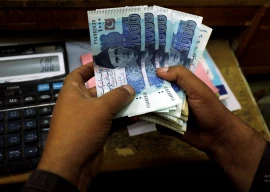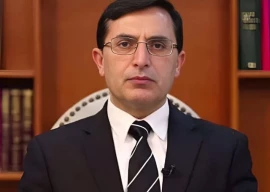
Judge Muhammad Bashir reserved the verdict after defence counsels Khawaja Haris and Amjad Pervez and NAB prosecutors concluded their arguments on the applications.
The accountability court was hearing the applications in line with an order of the Islamabad High Court (IHC) which had set aside its decision of October 19 “to the extent of deciding the applications filed by the petitioners regarding the joinder of charges”.
“The applications filed by the petitioners shall be deemed to be pending before the learned Trial Court and the same shall be decided in accordance with mandate of Section 17(d) National Accountability Ordinance, 1999 and the applicable laws expeditiously,” IHC’s division bench stated in its November 2 order.
Sharif, his daughter Maryam Nawaz, and son-in-law Captain (retd) Muhammad Safdar appeared before the court on corruption references in connection with the Avenfield Apartments, Flagship Investments Ltd and Al-Azizia & Hill Metals Establishment.
Sharif and his sons, Hussain Nawaz and Hassan Nawaz, have been named in all the three references while Maryam and Safdar have been named only in the Avenfield Apartments reference.
When the case was taken up, Sharif’s counsel Haris highlighted commonalities, saying the details of the Joint Investigation Team (JIT) report and allegations in the three references were the same and overlapping.
“Not one reference, but one trial is sought,” he said.
Sharif, Maryam and Safdar indicted
In his arguments, Haris said allegations were not clear and no specific role had been assigned to the accused persons, adding that there was “no mention of facts and offences in three references describing [as to] what they constituted [to]”.
He said the JIT and NAB investigation reports were also silent over the offences committed by the accused.
“NAB has not specified if Section 9(a)(v) is applicable,” he said, adding that the case was the first of its kind where it was not even mentioned who was the principal accused and who were Benamidars.
“The Sharif family owns the properties [and] not just the applicant [Sharif],” he said, adding that the person who owned the property was bound to give an explanation regarding the reference under Section 9(a)(v) of NAB Ordinance of 1999, but the section does not state that others having interests in the properties should give explanations.
“Investigators have to be very clear about allegations and roles of the accused,” Haris added.
“Two charges cannot stand together as a charge will only be different when specific allegations are levelled. Even the charge framed by this court is combined,” he said, while reading the last paragraph of the charge-sheet stating names of the accused together.
He emphasised that Section 9(a)(iv) and 9(a)(v) were different and could not be mixed up.
NAB files four corruption references against Sharif family, Ishaq Dar in accountability courts
Pervez, the counsel for Maryam and Safdar, adopted Haris’ arguments.
In response, NAB prosecutor Sardar Muzaffar Abbasi said, “The facts are different, accused are different, references cannot be joined and the references are not connected. The accused can’t insist on joinder of charges.”
Abbasi said separate references were filed as per the Supreme Court’s instructions given in the July 28 order. A review petition of the accused had been dismissed by the Supreme Court and the July 28 decision had attained finality, he added.
“Section 17(d) of NAB Ordinance of 1999 is not applicable,” Abbasi said, adding that statements of witnesses were different and a joint trial was not possible.
Another prosecutor Wasiq Malik said separate trials would not prejudice defence’s case as opposed to a joint trial which could prejudice the trial. Malik said references pertaining to different occurrences and different roles had been assigned to the accused.
Malik revealed that the request for Mutual Legal Assistance (MLA) was still awaited and chances were that the number of accused could increase. He said NAB had yet to determine the role of National Bank of Pakistan (NBP) President Saeed Ahmed and others.
Moreover, Malik said, trial could not be combined on the application of one accused, adding that two of the accused, Hassan and Hussain, had not yet joined the trial and it was not clear what their stance would be to a joint trial.
Subsequently, NAB requested the court to dismiss the applications and start recording evidence.
Following the arguments, the court reserved its verdict which is expected to be announced on Wednesday (today).

















COMMENTS (2)
Comments are moderated and generally will be posted if they are on-topic and not abusive.
For more information, please see our Comments FAQ